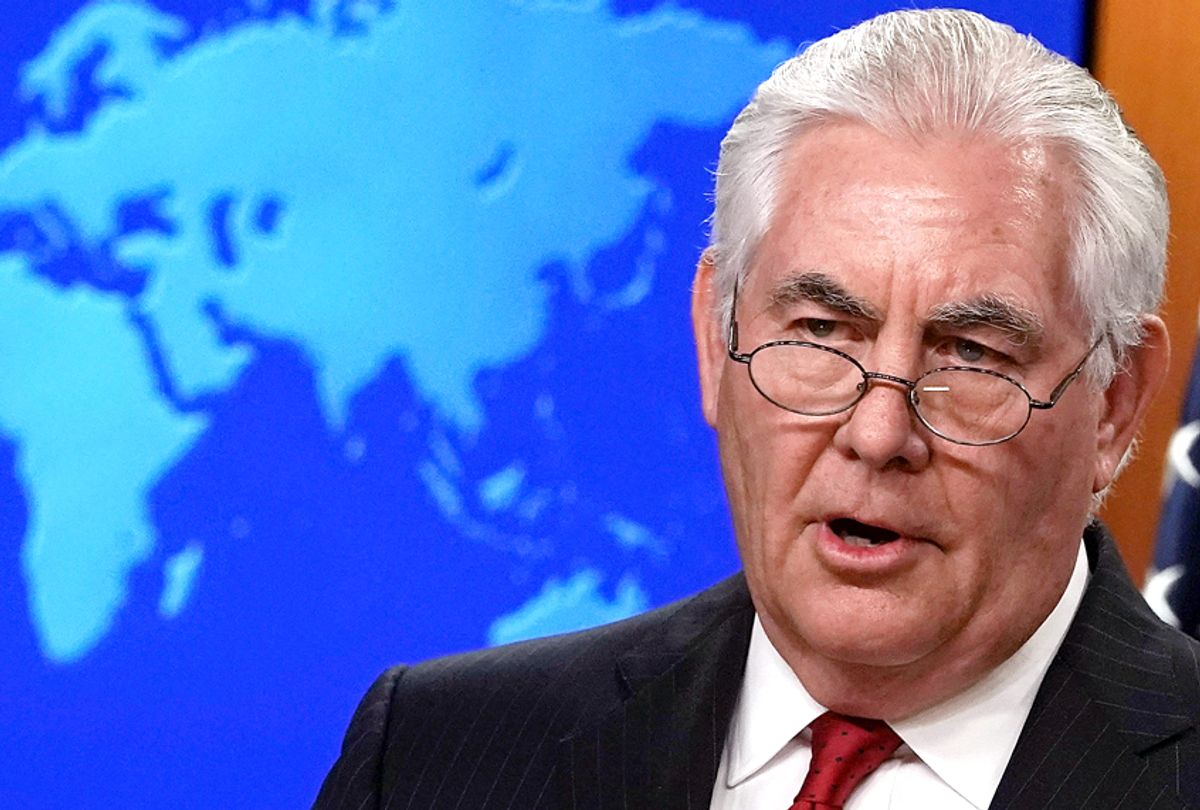After a little over a year in office, Secretary of State Rex Tillerson was fired Tuesday morning, to be replaced by CIA Director Mike Pompeo. Gina Haspel will take over Pompeo's post as CIA Director, becoming the first woman to hold the spot. The news was announced by President Trump in an early morning tweet. "Thank you to Rex Tillerson for his service!" Trump wrote. Tillerson's exit was confirmed by the White House in an official statement.
The former Exxon CEO's departure marks the end of a tumultuous tenure — and one of the shortest of any secretary of state in modern U.S. history, at 405 days — and it was not, experts say, colored by many accomplishments. Tillerson's time in office "will be remembered as extremely unfortunate," Robert Jervis, Adlai E. Stevenson Professor of International Affairs at Columbia University, told Salon in an interview. Jervis also called Tillerson's stint "an abject failure."
Tillerson was ousted amid various clashes and policy disputes with President Trump. Tensions between the two escalated this past summer after NBC News reported that the Secretary of State called the president a "moron" after a July 20 meeting at the Pentagon. Tensions seemed to come to a breaking point after Trump delivered a politically charged speech at a Boy Scouts convention, after which Tillerson, a former Boy Scouts head and Eagle Scout, reportedly threatened to resign.
A man with no government nor diplomatic experience, Tillerson's appointment to serve as the U.S. Secretary of State caused a division among Democrats and Republicans, and was met with reservations by the U.S. policy community.
Those who opposed the nomination highlighted Tillerson's lack of diplomatic experience, his opposition to sanctions and his relationships with various governments around the world, some of which are authoritarian and opposed to the United States. Those in favor emphasized his leadership skills from his time as the head of one of the most powerful companies in the world, as well as his international experience and ability to make difficult deals, especially with world leaders.
"He's an excellent choice to be secretary of state, and he has the opportunity to be an extraordinarily effective one because he has the management skills, he's got the international experience and he's got the negotiating skills to do a very good job," said former Secretary of State James A. Baker, III on CBS This Morning.
Roughly one month after the presidential election, President Trump described him as a "world class player and a deal maker" in a tweet.
Despite initial differences about his appointment, scholars and foreign policy experts across all political stripes seem to agree that Tillerson will leave office without distinction.
"I think he will really go down as one of the worst secretaries of State we've had," Eliot Cohen, counselor to the State Department under President George W. Bush, told Axios's Jonathan Swan. "He will go down as the worst Secretary of State in history," tweeted Ilan Goldenberg, a State Department official during the Obama administration.
Under Tillerson's watch, many State Department positions, which experts have labeled as crucial, remained unfilled, such as ambassadorships in South Korea and in various European and Middle Eastern countries. That is in addition to a report that 60 percent of the State Department's top management left and new applications to join the foreign service fell by half, according to data from the American Foreign Service Association.
"Our leadership ranks are being depleted at a dizzying speed," Barbara Stephen, a former U.S. ambassador to Panama and the head of the AFSA, wrote in a letter for the December 2017 issue of the Foreign Service Journal.
But is Tillerson to blame? If you can say thing about the Trump administration, it is that it is largely impossible to exert significant influence over the president or over his chaotic White House — a place with record-breaking staffing turnover and where policy is often made or announced on Twitter.
When asked in November about job vacancies at the State Department by Fox News' Laura Ingraham, Trump said, "Let me tell you, the one that matters is me. ... I'm the only one that matters, because when it comes to it, that's what the policy is going to be. You've seen that, you've seen it strongly."
Tillerson's departure underscores the notion that it's Trump's way or the highway; indeed, the president announced Tillerson's exit in a tweet, and that's how the secretary found out.
Still, foreign policy experts don't think Tillerson is a victim of Trump. "He was complicit," Jervis said. "Tillerson took the same attitude as Trump and made clear he was going to reorganize the State Department. ... But he went about it badly and he failed."
In an emotional post-firing speech today, Tillerson said he is delegating his responsibilities as Secretary of State to his deputy, John J. Sullivan, by the end of the day, and he will formally step down at the end of the month.
"I'll now return to private life as a private citizen. As a proud American, I'm proud of the opportunity I've had to serve my country. God bless all of you. God bless the American people. God Bless America," he said.



Shares